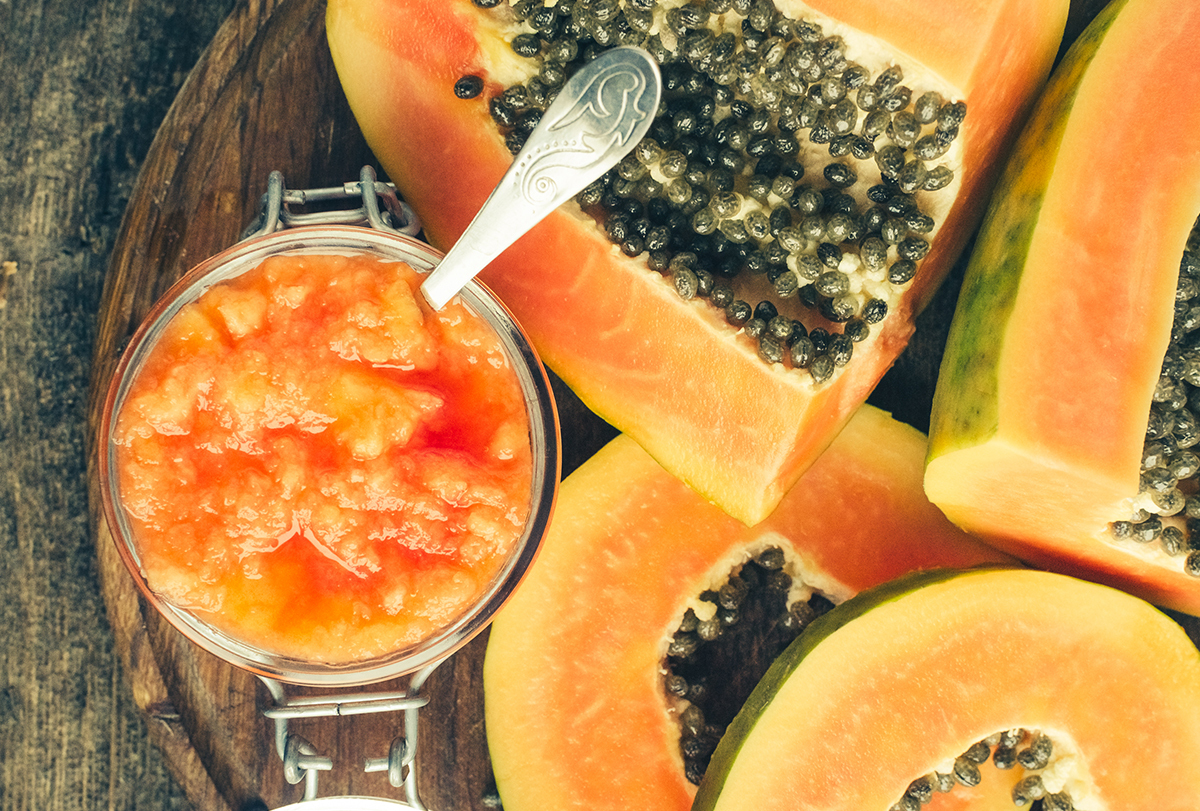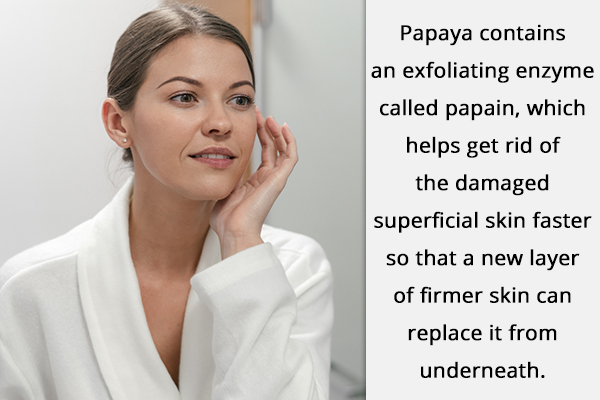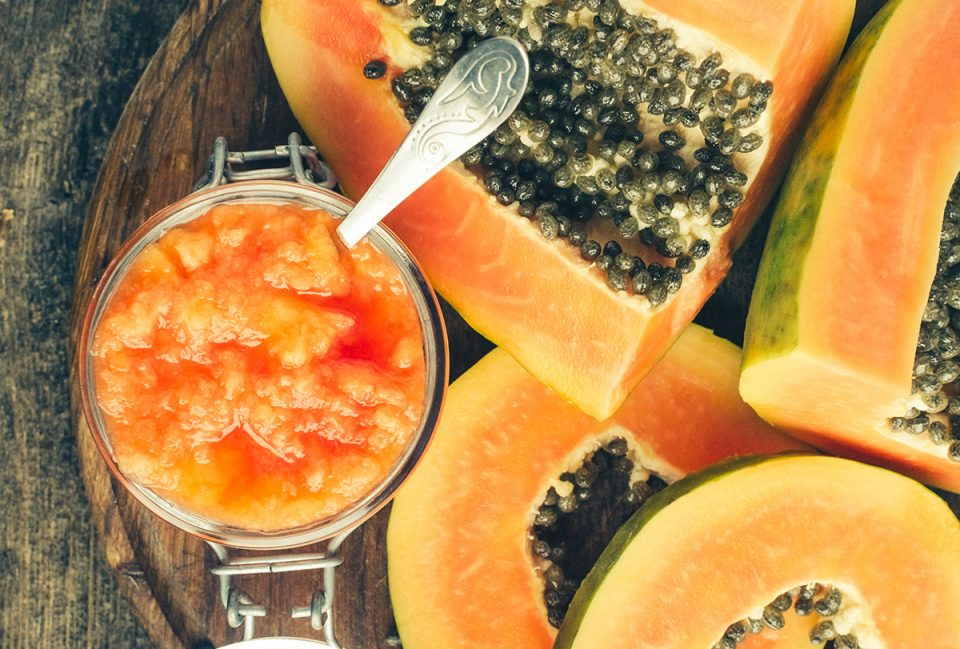Papaya is a tropical fruit that is widely popular for its sweet juicy flavor, but there is more to it than just that. This appetizing delight also packs a lot of nutrients, fiber, and enzymes that can do wonders for your health. (1)

The best way to derive its nutritional benefits is through consumption, but this fleshy fruit can also be used topically to enhance your beauty. This article will take you through some of the lesser-known beauty applications of papaya that can improve the quality of your skin and hair.
Skin Benefits of Papaya
The major dermatological benefits of papaya are:
- Gentle exfoliation: Papaya contains a chemical enzyme called papain, which helps dissolve the dead skin cells settled on top of the face to make them shed easily. The removal of this damaged outer layer allows new tighter, brighter, and healthier skin to rise to the surface. (2)
- Collagen building: Papaya is replete with vitamins A and C, both are known to stimulate the production of collagen and elastin. Collagen is a structural protein that is needed for making new skin cells. Being the most abundant component in skin, it gives your skin volume and bounce. Meanwhile, elastin is a structural protein that gives elasticity to your skin so that it remains tight and supple. (3)
- Fighting free radical damage: Papaya is full of potent antioxidants including vitamins A and C that curb the activity of free radicals and minimize the skin damage caused by them. Free radicals are unstable reactive molecules that attack healthy skin cells, inducing dullness, hyperpigmentation, and premature skin aging.
Topical Beauty Remedies Using Papaya
Here are some ways to use papaya for improved skin and hair quality:
Disclaimer: Always use ripe papaya for these topical remedies, since raw papaya contains high concentrations of papain, which can be too harsh on the skin and cause irritation and even blistering. Make sure to patch test each of these remedies before full-scale application to rule out any allergic or adverse skin reactions.
1. To reduce signs of aging

Papaya can be used topically to keep your skin looking younger for longer. For starters, its antioxidant properties inhibit the breakdown of skin fibers at the hands of free radicals.
Secondly, it contains an exfoliating enzyme called papain, which helps get rid of the damaged superficial skin faster so that a new layer of firmer skin can replace it from underneath.
Lastly, its rich vitamin C content helps promote collagen and elastin synthesis, which helps increase cell turnover while adding to skin volume, elasticity, and hydration. (4)(5)
All these factors keep your skin from sagging and developing premature signs of aging such as wrinkles, fine lines, age spots, and crow’s feet.
How to use:
Method 1
- Cut half of a fresh papaya into small pieces (without the seeds) and put them in a blender.
- Brew white or green tea, let it cool down, and then pour 1 tablespoon of it into the blender.
- Add 1 tablespoon plain Greek yogurt, 1 egg white, and 1 teaspoon rose water to the mix.
- Blend all the ingredients together to make a smooth paste. If you don’t have a blender or food processor, use a fork to whisk all the ingredients into a paste.
- Apply the mixture to your cleansed face and neck.
- Leave it on for 20–30 minutes before rinsing it off with lukewarm water.
Method 2: For crow’s feet
- Gently massage a small piece of raw papaya around the eyes for 5 minutes.
- Wait for 10 minutes so that the nutrients and enzymes in the juice get properly absorbed.
- Rinse the skin with cool water.
- Apply a moisturizer thereafter.
- Do this once daily.
Method 3
- Mash 1 tablespoon of ripe papaya pulp.
- Mix in a little bit of olive oil.
- Apply the paste to the area around the eyes.
- Let it sit for 20 minutes.
- Wash it off with cool water.
- Apply a moisturizer.
- Do this once daily.
2. To heal acne
Papaya facials can be great for acne control. Acne is mostly caused by the buildup of cellular debris, sebum, and germs inside the skin pores. The exfoliating properties of papain can help clear your clogged pores to reduce breakouts.
Plus, papaya helps lighten the acne scars by accelerating skin renewal. The damaged outer layers will get sloughed off and be replaced by fresh new skin from underneath, which will inadvertently fade these blemishes. (6)
How to use:
- Mix 2 tablespoons of mashed papaya pulp, 1 tablespoon of aloe vera gel, and ½ tablespoon of honey to make a smooth paste.
- Apply this mixture to your cleansed face
- Let it sit for 20 minutes before rinsing it off.
- Finish off with a mild moisturizer.
3. To whiten skin
Papaya is credited with natural bleaching properties, which can be attributed to papain. (7) This enzyme helps loosen the bond between dead cells settled on the surface of the skin to facilitate their easy removal.
As the dull, damaged outer layer gradually sheds, it is replaced by new healthy skin from underneath. This skin resurfacing will not change your actual complexion, but it will help even it out while adding a natural glow to your face.
How to use:
- Mix 3 tablespoons of mashed ripe papaya, 1 tablespoon of chickpea flour, 1 tablespoon of sandalwood powder, and 2–3 drops of lemon juice to make a paste.
- Apply this mixture to your cleansed face and neck.
- Leave it for 10–15 minutes and then rinse it off with water.
4. To exfoliate the skin
The accumulation of dead cells on the surface of the skin makes it appear dull and unhealthy. Plus, this cellular buildup can clog your pores, which can trigger acne breakouts.
So, it is important to exfoliate your skin 2–3 times a week. The papain enzyme found in papaya works as a gentle chemical exfoliant for your sensitive facial skin.
How to use:
Method 1
- Dice 1⁄3 cup of ripe papaya pulp and mash them to make a smooth paste.
- Mix in ½ cup of white or brown sugar and 1 tbsp of milk until everything is properly blended.
- Scoop the mixture into an airtight jar or container, and keep it in the fridge for no more than 2–3 days.
- Gently rub it on damp skin in slow circular motions for a few minutes and then rinse it off.
Method 2
- Grind ¼ cup of papaya pulp along with ¼ cup of powdered oats to make a paste.
- Mix a few drops of coconut/olive oil into the paste.
- You can also add any essential oil of your choice, but this is completely optional.
- Wet your skin and lightly massage this mixture on it using slow circular motions.
Note: These homemade scrubs can be used on the face as well as the rest of the body, but no more than 2–3 times a week. Also, you can refrigerate the leftover product for later use but don’t store it for more than 2–3 days.
5. To moisturize skin
The flesh of a ripe papaya is rich in water, fat, and carbohydrates that can help nourish, hydrate, and revitalize your dull, dry, lifeless skin. (8)
How to use:
- Mash ½ cup of ripe papaya.
- Grind 2–3 soaked almonds to make a paste.
- Add the almond paste, 2 tsp of whole milk, and 1 tbsp of honey into the mashed papaya.
- Mix all the ingredients to make a fine paste.
- Apply this mixture to your face and neck.
- Wait for it to dry and then rinse it off with plain water.
- Use this remedy 1–2 times a week for best results.
6. To treat cuts and burns
Papaya is credited with wound-healing properties that can be traced back to the papain enzyme found in it. (9)
Papain increases cell turnover, which helps speed up skin repair. It also protects the wound from infection-causing bacteria and minimizes scar formation.
One added advantage is that it does not sting when used on an open wound, which makes it easy to use on children. You can apply this remedy to cuts and burns.
How to use:
- Clean the wound with running water.
- Let it dry.
- Gently rub a fleshy piece of papaya onto the wound.
7. To remove scalp buildup and control dandruff
The accumulation of sebum, dead cells, product residue, and other impurities on the scalp can clog your hair follicles. Clogged hair follicles are unable to receive proper nutrition and moisture, which are needed to support healthy hair growth.
As a result, you may suffer from excessive hair fall and slow hair growth. The scalp buildup can also lead to fungal infections such as dandruff, which will further hamper your hair quality.
You can use papaya topically to give your scalp a deep cleanse and avoid these problems. The papain enzyme in papaya can help break down and loosen the scalp buildup so that it can be cleared easily.
How to use:
- Put 1⁄3 cup of ripe papaya pulp, 2–3 tablespoons of neem, and 1 tablespoon of coconut oil in a bowl.
- Mix all the ingredients well to make a paste.
- Apply this mixture to your scalp and hair.
- Let it sit for 20 minutes before rinsing it off.
8. To condition hair
The chemical enzyme papain found in papaya helps dissolve the layer of oil and grime settled on your hair for a thorough cleanse.
This allows the easy absorption of nutrients and moisture into the cuticle, which is the porous outermost covering of the hair shaft. This nourishment and hydration helps make your hair strong, shiny, and soft.
Papaya itself imparts several nutrients as well as hydration to the hair.
How to use:
Mix ½ cup of ripe papaya pulp with 1 cup of yogurt and 1 tablespoon of honey in a blender to make your own hair conditioner.
Side Effects of Papaya Usage
Papaya is mostly considered safe for topical use but only in small amounts. This fruit contains a lot of active ingredients, including the chemical enzyme papain, which can be too abrasive when applied in concentrated amounts.
Moreover, some people are allergic to this enzyme but are unaware of it. In such cases, applying even a small amount can cause hives, severe skin irritation, and even blister formation.
Most-Asked Questions About Papaya
Can I use papaya on my face every day?
Papaya is full of active ingredients including papain, which can damage and irritate your sensitive facial skin when applied in excessive amounts or too frequently.
So, it is best to err on the side of caution and use these topical remedies in moderation or as directed.
Is papaya good for oily skin?
Yes, papaya is loaded with vitamin C, which can curb excessive sebum production.
It also contains vitamin A, which can help your skin retain its natural moisture. The lack of skin moisture usually triggers the sebaceous glands into overdrive, resulting in excessive oil production, thereby making your skin greasy.
Final Word
Papaya can be a great value addition to your beauty regimen, but it is not a magic solution that will transform your skin and hair in a single use.
You have to use these remedies consistently along with a stringent skin care routine, nutritious diet, and an overall healthy lifestyle to get desirable and sustainable results.

